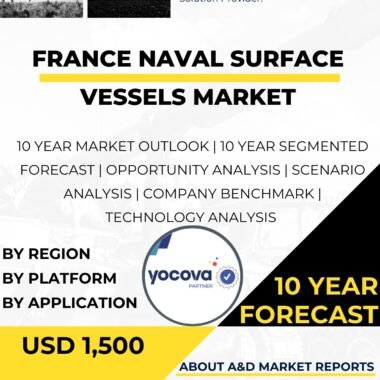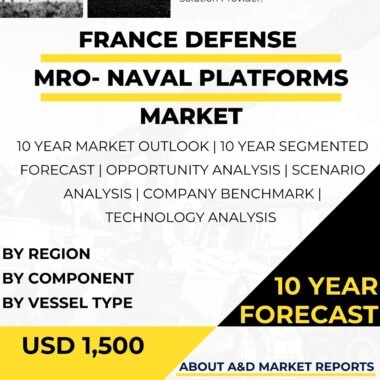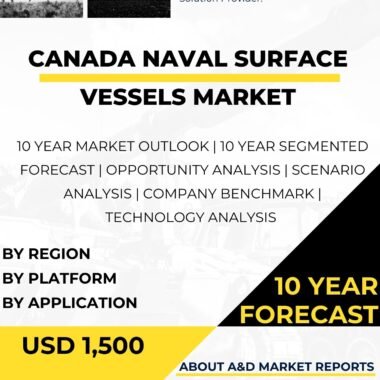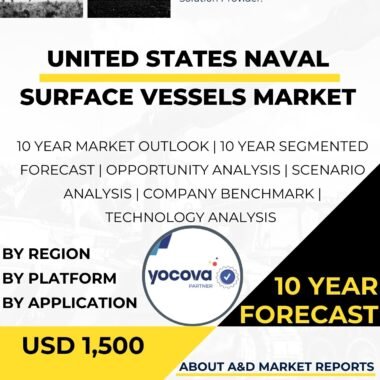Description
Overview of the UK Naval Surface Vessels Market
The Naval Surface vessels Market plays a major role in strengthening maritime security and protecting national interests. These vessels include frigates, destroyers, aircraft carriers, patrol boats, and mine countermeasure ships. Each type supports different missions and enhances the Royal Navy’s overall capability. Their versatility makes them vital for operations in UK waters and international seas. This market continues to evolve as new challenges emerge.
Development and Procurement in the UK Naval Surface Vessels Market
A key focus of the UK naval surface vessels market is the design and procurement of advanced ships that can meet evolving maritime demands. Accordingly, the government and defense industry invest heavily in next-generation platforms. These vessels are required to support diverse missions while complying with strict naval standards. Moreover, continuous investment ensures the Royal Navy maintains technological relevance. As a result, this approach significantly strengthens the UK’s overall maritime readiness.
Operational Applications of Naval Surface Vessels
The UK naval surface vessels market supports a wide range of operational roles across domestic and international waters. For instance, ships conduct routine patrols, protect territorial waters, and enforce maritime laws. In addition, they play an important role in anti-piracy missions and humanitarian assistance operations. Naval vessels also regularly participate in multinational exercises with allied forces. Consequently, their flexibility allows rapid response to changing maritime challenges.
Technology Integration in the UK Naval Surface Vessels Market
Modernization is central to the UK naval surface vessels market, with advanced technology enabling effective operations. These vessels integrate updated sensors, secure communication systems, modern weapon suites, and efficient propulsion technologies. Furthermore, such upgrades enhance performance in complex and contested maritime environments. Improved situational awareness and combat readiness also result from these systems. Therefore, continuous technological integration ensures long-term fleet
Versatility and Mission Flexibility
Versatility is a major strength of the UK naval surface vessels market. Ships are built to handle high-intensity warfare and routine security patrols. They can also support humanitarian missions and disaster relief. This flexibility allows the Royal Navy to operate anywhere in the world. It also ensures quick response to fast-changing threats.
Role in Joint Military Operations
Naval surface vessels in the UK often operate alongside submarines, aircraft, and intelligence, surveillance, and reconnaissance (ISR) platforms. This coordination strengthens mission effectiveness by enabling rapid information sharing across multiple assets. Joint operations enhance maritime surveillance, support large-scale defense missions, and improve overall operational responsiveness. Consequently, integrated missions allow the Royal Navy to maintain superiority in both national and coalition maritime operations.
Innovation and Advancements in Surface Vessel Technology
Innovation drives the UK naval surface vessels market, focusing on improvements in speed, endurance, and survivability. Modern materials, advanced propulsion systems, and integrated weapons technologies enhance ship performance. Research also explores the integration of unmanned surface and underwater systems for future operations. These advancements ensure that the UK maintains a strong naval presence while adapting to evolving maritime threats.
Training and Expertise in Naval Operations
The effectiveness of naval surface vessels relies heavily on well-trained crews. Training programs cover navigation, maritime tactics, shipboard operations, and emergency procedures. Crews must be proficient with modern sensor systems, weapons, and communication technologies. Skilled personnel improve operational safety, mission success, and overall fleet readiness, making human expertise a critical component of the naval program.
Strategic Planning and Vessel Deployment
Deploying naval surface vessels requires detailed strategic planning. Decision-makers evaluate mission priorities, regional threats, and fleet composition to optimize deployment. This ensures that each ship operates efficiently while supporting broader maritime defense strategies. Careful planning also maintains operational balance across different vessel types, enabling the UK to respond flexibly to emerging challenges.
Challenges in the UK Naval Surface Vessels Market
The market faces several pressures, including the high cost of research, development, and construction of modern vessels. Balancing advanced technology with affordability is a continuous challenge. Rapidly evolving threats demand frequent system upgrades, while global competition increases the need for innovation. These factors shape the future direction of the UK naval surface vessels sector.
Partnerships and International Cooperation
The UK collaborates closely with allied nations to strengthen naval capabilities. Joint programs help share development costs, improve interoperability, and coordinate multinational exercises. Partnerships also facilitate technology exchange, training, and research collaborations. Such international cooperation enhances maritime security and strengthens the UK’s global naval influence.
Conclusion
The UK naval surface vessels market is central to national defense, ensuring maritime security and supporting global missions. Advanced ship systems, highly skilled crews, and strategic partnerships guarantee operational readiness. Continuous innovation and investment in technology will allow the Royal Navy to meet future challenges and maintain a robust naval capability.
Table of content
Table Of Contents
1 Market Introduction
1.1 Market Introduction
1.2 Market Definition
1.3 Market Segmentation
1.4 10 Year Market Outlook
2 Market Technologies
3 Global Market Forecast
3.1 Global Market Forecast
3.2 By Platform
3.3 By Application
4 Europe Market Trends & Forecast
4.1 Drivers, Restraints And Challenges
4.2 PEST
4.3 Market Forecast
4.3.1 Market Forecast By Platform
4.3.2 Market Forecast By Application
4.4 Scenario Analysis
4.5 Key Companies& Profiling
5 United Kingdom Analysis
5.1 Current Levels Of Technology Maturation In This Market
5.2 Market Forecast
5.2.1 Market Forecast By Platform
5.2.2 Market Forecast By Application
5.3 Scenario Analysis
5.4 Country Defense Budget (Historical and 10- year forecast)
5.5 Defense Budget Category Spending- 10- year forecast
5.6 Procurement Analysis
5.7 EXIM Data
5.8 Patents
6 Opportunity Matrix
6.1 By Platform
6.2 By Application
7 Scenario Analysis
7.1 Scenario 1
7.1.1 By Platform (Scenario-1)
7.1.2 By Application (Scenario-1)
7.2 Scenario 2
7.2.1 By Platform (Scenario-2)
7.2.2 By Application (Scenario-2)
8 Company Benchmark
9 Strategic Conclusions
10 About Aviation And Defense Market Reports
Segments
By Platform
By Application
List of Tables
Table1: Global Market Forecast, United Kingdom Naval Surface vessels Market
Table2: Europe Market Forecast, United Kingdom Naval Surface vessels Market
Table3: Europe Market Forecast, By Platform
Table4: Europe Market Forecast, By Application
Table5: Europe, Scenario Analysis
Table6: United Kingdom Market Forecast, United Kingdom Naval Surface vessels Market
Table7: United Kingdom Market Forecast, By Platform
Table8: United Kingdom Market Forecast, By Application
Table9: United Kingdom, Scenario Analysis
Table 10: United Kingdom Defense Budget 10 Year Forecast
Table 11: United Kingdom, Defense Budget Category Spending- 10- year forecast
Table 12: United Kingdom, Procurement Analysis
Table 13: United Kingdom, EXIM Data Analysis
Table 14: United Kingdom, Opportunity Analysis, By Platform
Table 15: United Kingdom, Opportunity Analysis, By Application
Table 16: United Kingdom, Scenario Analysis, By Platform
Table 17: United Kingdom, Scenario Analysis, By Application




